When it comes to potty training your 3-year-old, knowing where to start can feel overwhelming. You might wonder about the signs of readiness or what equipment to choose. Establishing a consistent routine is crucial, but so is making the process enjoyable for your child. While it's easy to focus on the challenges, there are effective strategies that can simplify this journey. By exploring these tips, you'll discover how to turn this milestone into a positive experience for both of you, but first, let's consider the importance of recognizing those readiness signs.
Understand Readiness Signs
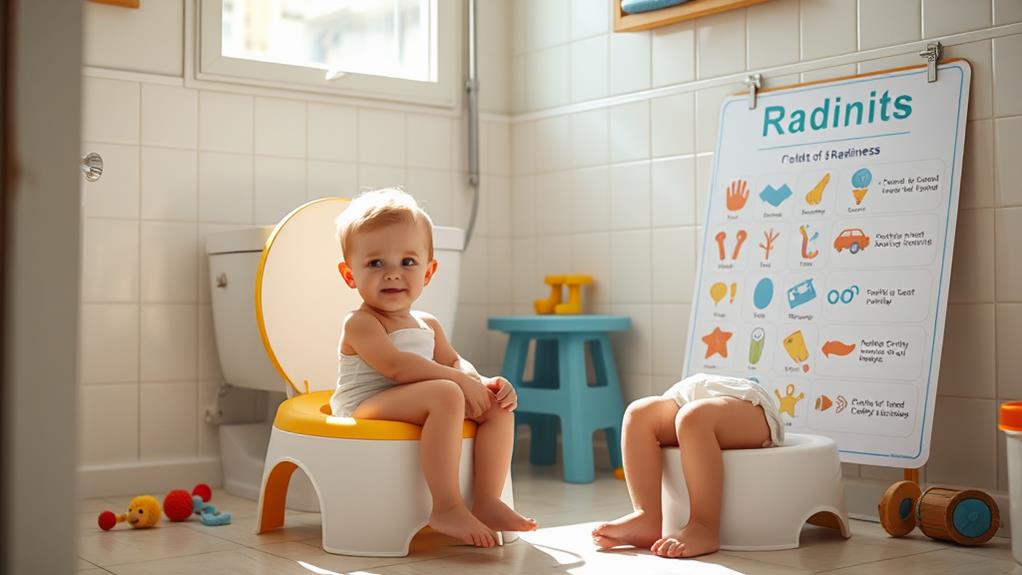
Recognizing readiness signs is crucial for successful potty training. You'll want to look for specific behaviors that indicate your child is ready to make the leap. One of the first signs is showing interest in the bathroom. If your little one starts following you or asking questions about using the toilet, it's a good indicator.
Another sign involves physical readiness; if your child can stay dry for longer periods, that's a positive development. Emotional readiness matters too. If your 3-year-old expresses discomfort in soiled diapers or shows a desire to wear big-kid underwear, they're likely prepared to start.
Pay attention to whether they can follow simple instructions, as this skill will help them understand the process. Lastly, consider their overall maturity. If they can communicate their needs or show independence, they're probably ready to tackle potty training.
Choose the Right Equipment
Once you've identified that your child is ready for potty training, it's time to choose the right equipment to support their journey. Start by selecting a potty that suits your child's needs. You can choose between a standalone potty or a seat that fits on your regular toilet. If your child feels more comfortable with a smaller, standalone potty, it might be a great choice to encourage independence.
Next, consider the potty's design. Some potties come with fun colors or characters that can make the experience more exciting. A potty that your child likes will make them more eager to use it.
Also, think about whether you want a potty with a removable bowl for easy cleaning—this can save you time and hassle.
Don't forget about accessories! A sturdy step stool can help your child reach the toilet easily, and a training seat can provide extra support.
Encourage your child to pick out their equipment to make them feel involved in the process. By selecting the right equipment, you'll set a positive tone for potty training, making it a fun and successful experience for both of you.
Create a Potty Schedule
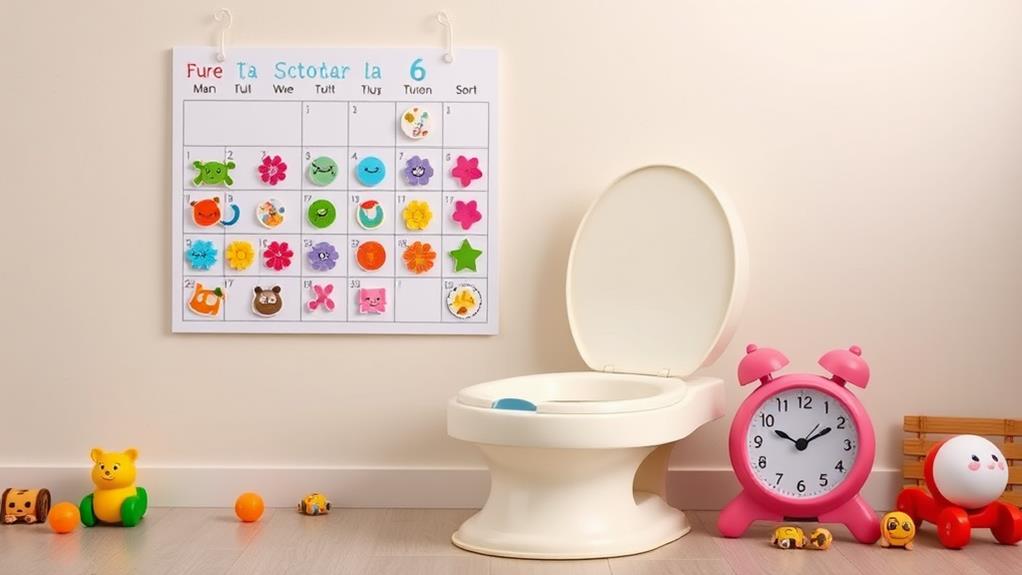
To help your child succeed in potty training, creating a potty schedule is essential. A consistent routine makes it easier for your little one to understand when it's time to use the potty. Start by noting your child's natural habits. Observe when they usually go, like after meals or before bedtime. This will help you identify the best times to encourage them to try.
Once you've pinpointed those times, set a schedule. For instance, you might decide to take your child to the potty every two hours, or right after meals and naps. Make sure to stick to this schedule as closely as possible, as consistency is key. If your child resists, gently remind them it's just a time to try, not a demand to go.
Don't forget to adjust the schedule as needed. As your child gets more comfortable, you can gradually extend the time between potty breaks.
Keep the atmosphere positive and stress-free, so they don't feel pressured. With a well-planned potty schedule, you're setting the stage for success, helping your child feel secure and confident throughout the process.
Use Positive Reinforcement
Using positive reinforcement can significantly enhance your child's potty training experience. When your child successfully uses the potty, celebrate that achievement! Praise them enthusiastically, using phrases like, "Great job!" or "I'm so proud of you!" This praise helps your child feel good about their progress and encourages them to keep trying.
In addition to verbal praise, consider using small rewards. Stickers, extra storytime, or a favorite snack can motivate your child to continue using the potty. You don't need to make it extravagant; even simple rewards can create a sense of accomplishment. Just remember to keep the rewards consistent to reinforce the behavior effectively.
It's also important to be patient. Accidents will happen, and that's okay! Instead of focusing on those slip-ups, redirect your attention to the successes. This approach fosters a positive atmosphere, making potty training a more enjoyable process for both of you.
Encourage Independence
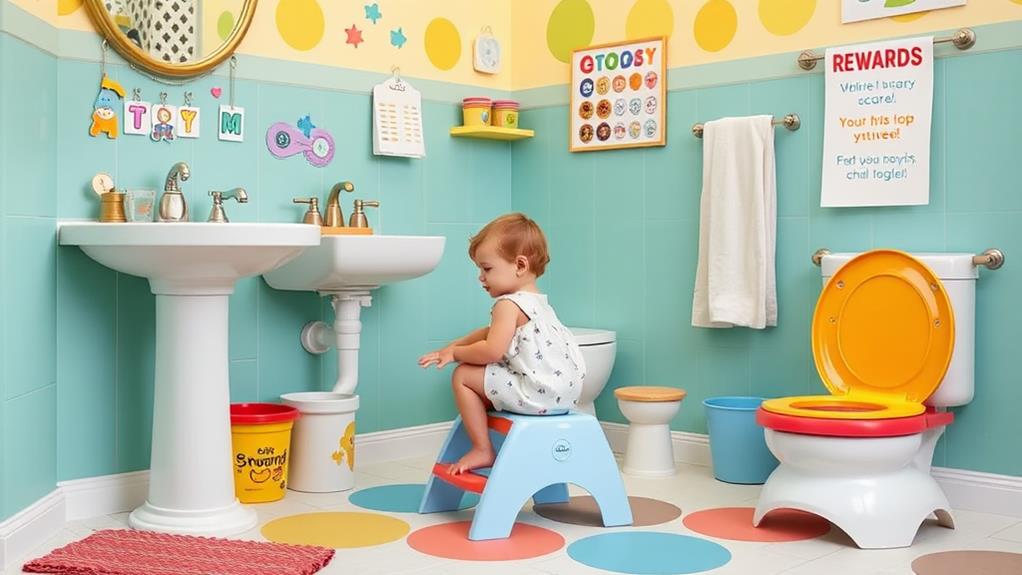
Encouraging your child to take charge of their potty training journey helps build their confidence and independence. Let them take the lead by allowing them to choose their own underwear, whether it's a favorite character or a bright color. When they feel ownership over their choices, they're more likely to engage with the process.
You can also give your child simple tasks, like pulling down their pants or flushing the toilet. These small responsibilities help them feel more in control and capable.
Make sure the bathroom is accessible—consider a step stool if the toilet is too high. This empowers them to reach everything they need without help.
Celebrate their successes, no matter how small. A simple high-five or verbal praise can go a long way in reinforcing their efforts. If they've setbacks, remind them that it's perfectly normal and part of the learning curve. Your support and encouragement create a safe space for them to explore their newfound independence.
Lastly, let them practice using the potty when they feel the urge, rather than on a strict schedule. This respect for their body's signals encourages them to listen and respond, further promoting their independence in the process.
Make It Fun
Making potty training enjoyable can significantly enhance your child's experience and motivation. When you turn this learning process into a game, your little one will be more excited to participate.
Use colorful stickers as rewards for each successful trip to the potty. Create a fun chart to track their progress, and let them decorate it with their favorite stickers.
Consider reading a silly potty-themed story together. This not only keeps them entertained but also reinforces the idea that using the toilet is a positive experience. You might even sing a catchy potty song that they can sing while they go.
Incorporate playful elements like a special potty dance after each successful attempt. Utilizing fun items like a special toilet seat or fun toilet paper can also spark excitement.
Encourage your child to pick their own potty training supplies, from underwear featuring their favorite characters to fun soaps for washing hands afterward.
Dress for Success
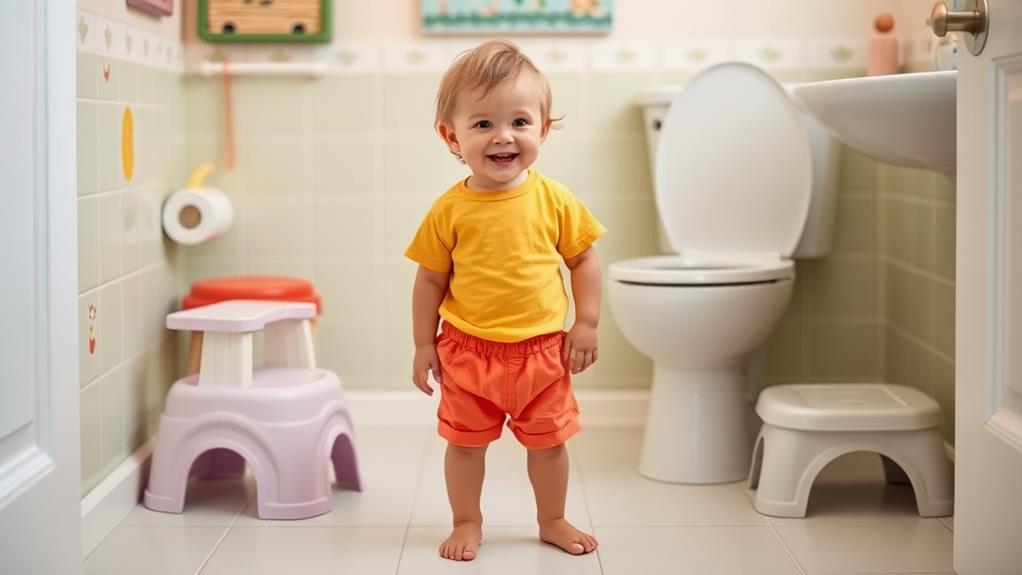
Dressing your child in easy-to-remove clothing can make a big difference during potty training. When your little one feels the urge, you want them to be able to act quickly, and that starts with their outfit. Opt for pants with elastic waistbands instead of those tricky buttons or zippers. This small change can help minimize accidents and frustration.
Consider using shorts or skirts, as they provide even easier access. Avoid overcomplicated outfits like rompers or dresses with lots of layers; they can lead to delays that might cause your child to lose focus and have accidents. Instead, stick to simple t-shirts or tops that they can pull off with ease.
Also, think about the fabric. Soft, breathable materials can help your child feel comfortable while they learn this new skill.
If your child is interested in picking out their clothes, encourage that! Letting them choose their favorite colors or characters can make the process more exciting for them.
Be Patient and Consistent
Patience and consistency are key elements in successful potty training. Remember, this process can take time, and every child progresses at their own pace. It's essential to stay calm and provide a steady routine. Kids thrive on predictability, so try to establish specific times for potty breaks, like after meals or before bed. This helps them understand when it's time to go.
When you're consistent with your approach, your child will feel more secure and confident. Use positive reinforcement, like praise or small rewards, to encourage them when they successfully use the potty. Celebrate those victories, no matter how small!
If your child resists or has setbacks, don't let frustration show. Your calm demeanor will reassure them that it's okay to make mistakes and keep trying. They'll pick up on your energy, so maintaining a supportive atmosphere is crucial.
Lastly, remember that every child is different. What works for one may not work for another, and that's completely normal. Stay committed to your routine, and before you know it, your little one will be mastering this milestone, giving you both a reason to smile!
Address Accidents Calmly
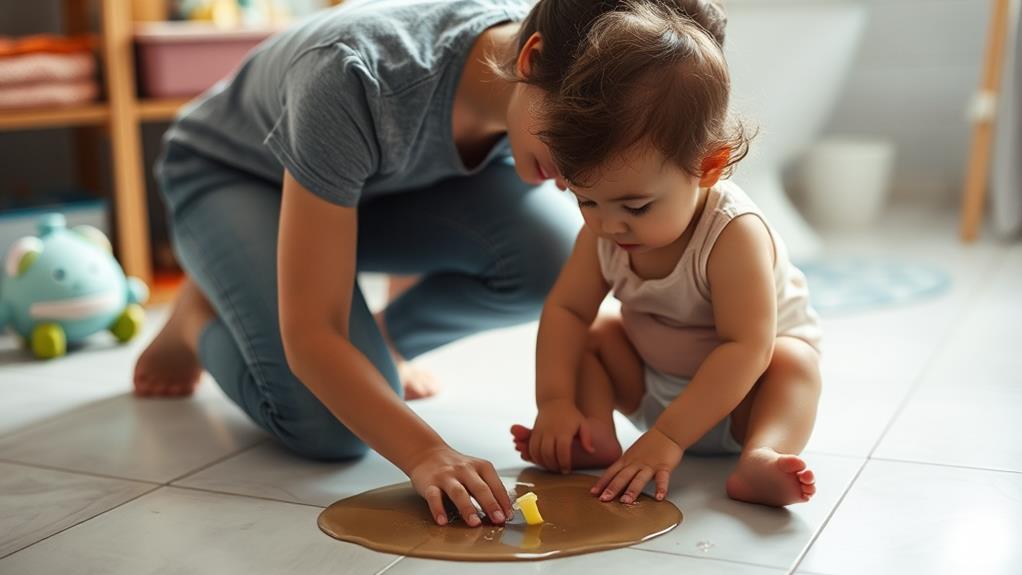
Accidents are a natural part of the potty training journey, and handling them calmly can make all the difference. When your child has an accident, it's important to react with understanding rather than frustration. Kids at this age are still learning, and getting upset can create anxiety around using the toilet. Instead, take a deep breath and remind yourself that this is a normal phase of development.
When an accident happens, gently reassure your child that it's okay. Use simple phrases like, "That's alright, we can try again next time." This supportive approach helps them feel safe and less embarrassed. Clean up the mess without making a big deal out of it. Your calm demeanor will show your child that accidents aren't something to fear.
Encourage your little one to express how they feel about the accident, but keep the conversation light. You might say something like, "Sometimes our bodies just don't cooperate." Reinforcing that accidents are part of the learning process helps them understand that it's okay to make mistakes.
Involve Your Child
Potty training can be a team effort, and involving your child in the process not only boosts their confidence but also makes it more enjoyable for both of you.
Start by letting your child choose their own potty or toilet seat. This small decision can spark excitement and give them a sense of ownership.
Next, encourage your little one to pick out fun underwear. Letting them choose their favorites can turn potty training into a fun adventure.
When it's time for a bathroom break, ask them if they'd like to go. This gives them control over the situation and helps them understand their body's signals.
You can also make potty training a game. Create a chart where they can place stickers for every successful trip to the toilet. This visual reward can motivate them to keep going.
Remember to involve your child in clean-up, too! Teaching them to help with washing hands afterward reinforces good hygiene habits.
Celebrate Milestones
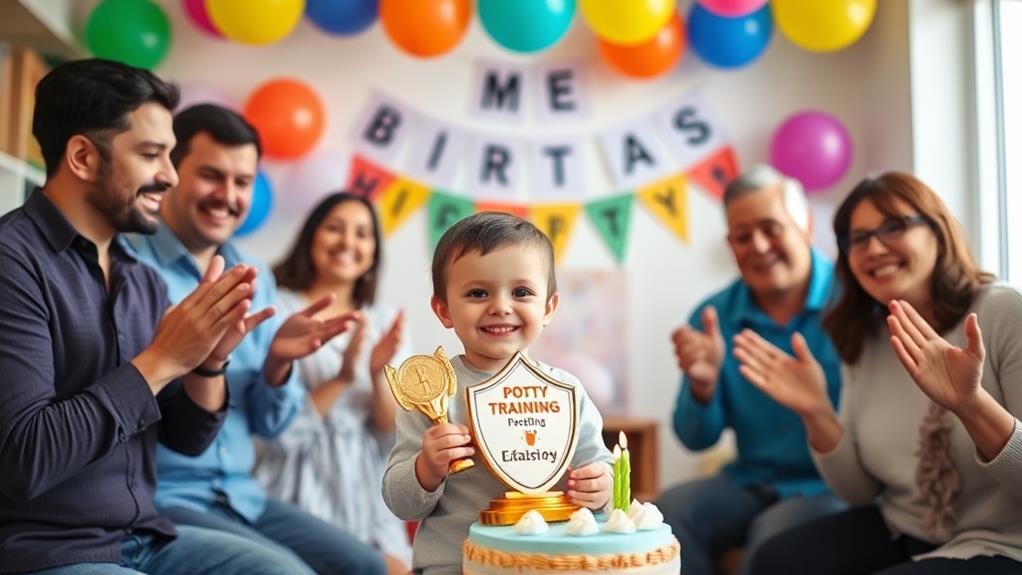
As your child becomes more comfortable with using the potty, it's important to celebrate their achievements along the way. Recognizing these milestones can build their confidence and make the process enjoyable. When they successfully use the potty for the first time, cheer them on! A simple high five or a happy dance can reinforce their accomplishment and motivate them to keep going.
Consider creating a rewards chart. For every successful day, let them place a sticker on the chart. Once they reach a certain number of stickers, reward them with a small treat or a fun outing. This not only makes potty training exciting but also helps them visualize their progress.
Remember to celebrate the little things, too. If your child tells you they need to go or has a dry night, acknowledge these steps. Positive reinforcement helps them associate using the potty with happiness and success.
Lastly, share these moments with family members. Let Grandma or Dad know about their progress. This builds a support network and provides additional encouragement.
Celebrating milestones turns potty training into a fun adventure, making your child more eager to participate in this important life skill!
